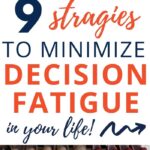Inside: Learn what decision fatigue is and the symptoms that you may be experiencing it. I’ll go over examples and show you how to minimize decision fatigue in your home and life.
Every day we have to make decisions. We make many of them without evening realizing it’s happening.
Constantly weighing your options can become exhausting. Do you ever wish someone else would make all the decisions for you, even if just for a day?
Kids, you can decide what I wear today. Husband, please decide what to make for dinner or where to order out from.
Although maybe those thoughts sound more horrifying than relieving. Perhaps you don’t want to relegate the decision making to others for fear that they would choose something other than what you’d want.
Still, at the end of the day, decision fatigue can become a very real, and very tiring, thing.

What Is Decision Fatigue?
How Many Decisions A Person Makes In A Day
It’s estimated that, on average, we make about 35,000 decisions per day! Researchers found that over 225 of those decisions were made on food alone.
Many of the decisions we make on a daily basis are subconscious. We don’t think about them as we make them.
So, What Is Decision Fatigue?
Decision fatigue is when you get to a point of feeling emotionally and mentally strained from the burden of all the choices you’ve made or need to make.
Is Decision Fatigue Real?
Social psychologist, Roy F. Baumeister, coined the term ‘decision fatigue’ and it’s a very real thing.
Even if we don’t immediately recognize it by that name, we know what it feels like to have too many decisions to make.
What Causes Decision Fatigue?
Being constantly faced with too many options causes decision fatigue. Those 35,000 decisions per day can drain your energy.
Every aspect of life requires making (nearly) constant decisions all day. No wonder we feel tired and worn down at day’s end.

How Decision Fatigue Impacts Your Life: The Downside of Too Many Choices
Different people respond to decision fatigue in a variety of ways. Here are a few common responses to decision fatigue.
Decision Avoidance
When experiencing decision fatigue, some people shut down. They’re so tired of making decisions that they just stop making them.
While you may be able to stop making decisions for a time, avoidance doesn’t solve anything.
Poor Decision Making
When you’re hungry and tired, do you make optimal choices on what to eat? I know I don’t. If you’re exhausted, you’re more likely to take the path of least resistance.
You’ll more likely choose what is easiest, rather than what may be best.
You don’t want to have to try and later undo those decisions or have to do damage control from a decision you wish you hadn’t made.
Stress & Exhaustion
Having to make too many decisions leads to increased stress and exhaustion. Decision fatigue can deplete your energy and prevent you from moving forward.
If you’re someone who is indecisive by nature, decision fatigue can feel even more debilitating.
People aren’t at their best when they are stressed and drained, so it’s ideal to find ways to minimize decision fatigue in your life.

Decision Fatigue Examples
Are you thinking, but what does decision fatigue look like? Here are a few examples of what it looks like.
Product options
Years ago, when I had my first daughter, I recall doing a lot of research on all things baby. I wanted to make sure I was making the ‘right’ choices for my daughter, but I was simultaneously overwhelmed with the sheer number of options for everything.
How does one decide which diapers, bottles, bouncers, and bibs are best for baby?
No matter what you shop for on Amazon, odds are you don’t have one or two options. Instead, you have pages and pages of choices.
If you like to thoroughly research your purchases, it’s easy to end up with analysis paralysis and feel like you’ve wasted precious hours of your time looking over all of the options.

Food options
Grocery shopping takes more time and effort with the number of options you have for any given item. I think that part of why Trader Joe’s and Aldi’s have become so popular is because it helps relieve some of the decision fatigue you’d be facing in a traditional grocery store.
It’s not only the groceries that can feel overwhelming but also the meal planning. We have so many sources for information including websites, Pinterest, and cookbooks.
How do you know what’s good and what isn’t? Why are there 32 different choices for chicken cacciatore recipes?
Or perhaps you’re taking the night off of cooking and opting to go out to eat or get takeout. You’re again faced with quite a few options in most cities.
And that’s before you even get to the menu. Have you eaten at a Cheesecake Factory recently? Those menus go on for days. Seriously, they have more than 250 options on the menu.
Being hungry in combination with decision fatigue is not a recipe for success.

Options within the home
When you go to get dressed in the morning, how many different options are you faced with? Decision fatigue is not something that just the outside world creates for us.
We bring it into our own homes when we have too many things. If you have duplicates of kitchen utensils, you are forcing your brain to make more decisions.
If you own twenty-five pairs of shoes, you have to work harder to decide what to put on your feet that day.
The more stuff we have, the more choices we have to make.
Decision Fatigue Symptoms
Think that decision fatigue may be impacting your life? Here are some symptoms you’re dealing with decision fatigue.
Exhausted
If you’re feeling exhausted at the end of the day and are mentally drained, decision fatigue may be part of the problem.
Irritable
Having to make too many decisions each day can also cause someone to feel stressed and irritable. It’s simply too much to constantly think about.
Unable to think clearly
If at the end of the day, your mind feels hazy and like it’s difficult to think clearly, that can be the result of making too many decisions each day.

How Do You Prevent Decision Fatigue?
It would be nice if you could completely avoid decision fatigue, but there isn’t a way to control every aspect of the world and the options within it.
However, you can adopt strategies to help minimize the impact of decision fatigue on your life.
9 Strategies to Minimize Decision Fatigue
These nine strategies will help to lessen the decision fatigue that you experience.
1. Make Your Decisions The Night Before
Creating an evening routine that helps you to prepare for the following day is a game-changer. As part of your routine, make a few of the decisions for the following day such as what clothes you will wear, what you will eat, and your most important priorities for that day.
Thinking and preparing ahead makes your mornings go more smoothly and starts your day off on the right foot.
2. Always Do The Most Important Thing Today First
Getting the most important task out of the way as soon as you are able helps to clear your mind. We often don’t realize how burdened we feel when we leave an important task to ‘do it later’.
Those things have a way of weighing us down until we’re able to get them off our plate. Get it done early and free up your mind for focusing on other things.
3. Steve Jobs Your Wardrobe
Steve Jobs wore basically the same outfit every day. He and a handful of other successful people have created their own uniform of sorts so that they don’t have to make decisions about their clothes.
It frees up mental energy when you know you’re basically wearing the same thing each day.
This isn’t something everyone would enjoy doing, but for some people, creating their own version of a uniform helps them to minimize decision fatigue.
4. Make Your Biggest Decisions In The Morning
If you know you need to make some big decisions, get them out of the way in the morning… after you’ve eaten something.
You won’t be able to think as clearly when you are tired or hungry so making those decisions when you’re at your best will help you make choices you feel good about.

5. Plan Your Meals Weekly or Make Ahead
Making decisions with meal planning and food can be exhausting, especially if you’re not someone who loves cooking. We try to stick to easy and simple meals in our home, but even that can feel tiring at times.
Spend a day or evening planning out your meals for the following week. I like to do this on Sunday nights. I write out what meals we will be eating and do my online grocery order that I pick up a few days later.
Planning ahead means you don’t have to spend a lot of time wondering what you’re going to eat throughout the week.
6. Delegate Decisions & Limit Options
Whenever possible, delegate some of the decision making. Can your spouse help with the meal planning?
Are there tasks at work that can be delegated to someone else in the office? Delegating some decisions when possible will help prevent decision fatigue.
Limiting options is another tactic that will help. Choose to shop at stores with fewer options. Opt for less, not more, when you can.
7. Set a Time Limit
Have you ever found yourself down the deep dark hole of online shopping where you’ve spent far more time than you intended in search of something? Just me? Ok.
If there’s something you really need, write a list of those items before you start shopping. This will help you to stay on track.
Set a time limit for how long you can spend on your order. This will keep you from wasting too much time and getting completely overwhelmed by all of the choices.
A deadline forces decision making so that you can stop overthinking your options.

8. Declutter the Excess
To minimize decision fatigue in your home, declutter the excess. The decluttering process itself will require you to make lots of decisions.
However, once you do that, you are left with fewer decisions to make on a daily basis. Ruthlessly declutter your closet and you’ll find that you’re left with pieces you wear and love.
It’s much easier to make decisions when you’re presented with fewer options.
Did you know that kids also get decision fatigue? Studies have shown that when they have too many toys they get overwhelmed.
Minimize the decisions everyone in your family has to make by decluttering the excess in your home.
9. Take Tech Breaks
It’s easy to be on various devices for a majority of your day. It takes intentional effort to take breaks from technology.
Our devices force us to make decisions constantly and, if you’re already beginning to feel fatigued, technology tends to make the problem worse, not better.
Schedule an alarm as a reminder to take a break. Go on a walk, get some fresh air, or do some other activity that will help you to give your mind and body a break from technology.
How to Overcome Decision Fatigue:
Simplify Your Life & Recognize Choice Overload
While decision fatigue may still happen from time to time, you can make it less prevalent by simplifying your life.
When you get rid of the excess stuff, whether that be things in your home or items in your calendar, you free yourself from having to constantly weigh decisions.
When you’re facing choice overload, reflect back on your priorities. Get clear on your purposes and intentions and the decisions will become easier.
Keep a Schedule and Daily Routines
The more that you are able to maintain a schedule and create daily routines in your life, the fewer decisions you have to make.
Habits move the to-dos from daily decisions you make to things that you do without even thinking about it.

Set Deadlines To Separate Big Decisions
When you know you have big decisions coming up that you have to make, set deadlines for them and give yourself a break between them.
Having to make tough decisions is hard. Make it a bit easier by allowing an appropriate amount of time and space to decide.
But also don’t give yourself so much time that you continue to overthink it for extended periods of time. It’s all about finding the balance.
Don’t Make Decisions When You’re Tired Or Hungry
Have you heard of the word hangry? It’s when someone is angry because their hungry. And it’s not pretty.
For as much as you are able, don’t make decisions when you’re hungry or tired. People are not able to think as clearly or make the best choices when they’re in this state.
Practice Self-Care
Life gets busy sometimes and in the busyness, you can forget to slow down and practice self-care. However, embracing self-care in your life will help you to make better decisions.
Regularly set aside time to slow down. Incorporate some of these easy ways to slow down into your life and notice how much more relaxed you feel.
Don’t Replay Decisions Once They’re Made
Once you’ve made a decision on something, let it go. Overthinkers are tempted to continue to think about decisions they’ve made and continue to ponder the ‘what-if’s’.
This wastes time and mental energy. Let it go and move on with your life.
How Do You Overcome Poor Decision Making? Use the H.A.L.T. Technique
The H.A.L.T. technique recognizes that people often make poor decisions when they are hungry, angry, lonely, or tired.
Recognizing your triggers and being able to identify these feelings will help to keep you from making decisions you’d later regret.

Hunger
As discussed earlier, people can get irritable when they are hungry. Hunger can lead to making poor choices with food or perhaps snapping at someone.
Don’t make decisions on an empty stomach.
Anger
When you’re angry, you can’t think rationally. You may make a decision based completely out of the emotion you’re feeling at the time.
Anger is when people say things they later regret. Don’t make decisions when you’re mad.
Loneliness
If you’re feeling isolated and lonely, it’s harder to have a clear head for making decisions. Loneliness can end up leading to anxiety and depression.
Talk with a friend about the decision you need to make and get some support to help you through it.
Tiredness
Similar to being hungry, being tired can also cause irritability and impair your judgement.
Make decisions after you’ve had a good night of sleep so that you mind is sharper.
Decision Fatigue Is a Real Thing, But You Can Minimize It!
While it would be impossible to avoid having to make any decisions, using the strategies in this post you can minimize the decisions you make on a daily basis.
As you declutter your home and simplify your life, you free up your mind to focus more on what matters most to you.
When you’re clear on your priorities, decision making becomes easier.
Want to keep up to date with The Simplicity Habit? Sign up on the form below to get weekly tips on simplifying and decluttering sent straight to your inbox! You’ll also get the free Your Home Decluttered Jumpstart which includes 100 easy items to declutter and 12 high-impact areas to declutter in 10 minutes.


Wow!!! This is exactly where I am at right now! So many drastic changes in my life recently and absolutely no constant in my days. God is good in using you to show me where I am at and how to improve the situation. Thank you.
Thank you Julianna! You clearly articulate the issues I have with decision fatigue; I didn’t even know there was such a term, but throughout your article I found myself saying “Yes!”, “That’s it!”, and “I can do this!” It’s empowering to realize I’m not the only one with decision fatigue challenges.
I’m so glad you found the post helpful, Joanne!
Love the Simlicty Habit…Has given me so much help with sorting out the boxes and boxes of things I have
“inherited’ from the passing of parents and other family members….so hard to let go of memories but it
has to be done or it takes over your life…Thank you!!!!
I’m so glad you’re finding the posts helpful, Kathy!
What about photos when kids were small. They don’t want them and honestly it makes me so sad to look back at them. I resist scanning them. It’s like a Pandora’s box that I don’t want to open. Discarding them all seems hard too??????? It’s the only thing I can declutter in my home.
I wrote a post about decluttering photos that you may find helpful here: https://www.thesimplicityhabit.com/how-to-declutter-photos-in-your-home/